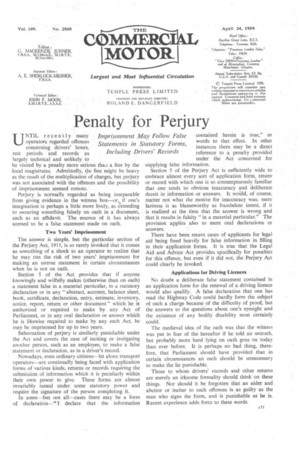Penally for Perjury
Page 33

If you've noticed an error in this article please click here to report it so we can fix it.
UNTIL recently many operators regarded offences concerning drivers' how's, rest periods and records as largely technical and unlikely to be visited by a penalty more serious thaa a fine by the local magistrates. Admittedly, the fine might be heavy as the result of the multiplication of charges, but perjury was not associated with the offences and the possibility of imprisonment seemed remote.
Perjury is normally regarded as being inseparable from giving evidence in the witness box—or,. if one's imagination is perhaps a little more lively, as extending to swearing something falsely on oath in a document, such as an affidavit. The essence of it has always seemed to be a false statement made on oath.
Two Years' Imprisonment The answer is simple, but the particular section of the Perjury Act, 1911, is so rarely invoked that it comes as something of a shock to an operator to realize that he may run the risk of two years' imprisonment for making an untrue statement in certain circumstances when he is not on oath.
Section 5 of the 'Act provides that if anyone knowingly and wilfully makes (otherwise than on oath) a statement false in a material particular, in a statutory declaration or in any "abstract, account, balance sheet, book, certificate, declaration, entry, estimate, inventory, notice, report, return or other document" which he is authorized or required to make by any Act of Parliament, or in any oral declaration or answer which he is likewise required to make by any such Act, he may be imprisoned for up to two years.
Subornation of perjury is similarly punishable under the Act and covers the case of inciting or instigating another person, such as an employee, to make a false statement or declaration, as in a driver's record.
Nowadays, even ordinary citizens—let alone transport operators—are continually being faced with application forms of various kinds, returns or records requiring the submission of information which it is peculiarly within their own power to give. These forms are almost invariably issued under some statutory power and require the signature of the person completing it.
In some—but not all—cases there may be a form of declaration—" I declare that the information contained herein is true," or words to that effect. In other instances there may be a direct reference to a penalty provided under the Act concerned for supplying false information.
Section 5 of the Perjury Act is sufficiently wide to• embrace almost every sort of application form, return or record with which one is so contemptuously farniliar that one tends to obvious inaccuracy and deliberate deceit in information or answers. It would, of course, matter not what the motive for inaccuracy was; mere laziness is as blameworthy as fraudulent intent, if it is realized at the time that the answer is wrong and that it results in falsity "in a material particular." The provision applies also to mere oral declarations or answers.
There have been recent cases of applicants for legal aid being fined heavily for false information in filling in their application forms. It is true that the Legal Aid and Advice Act provides specifically for penalties for this offence, but even if it did not, the Perjury Act could clearly be invoked.
Applications for Driving Licences No doubt a deliberate false statement contained in an application form for the renewal of a driving licence would also qualify. A false declaration that one has read the Highway Code could hardly form the subject of such a charge because of the difficulty of proof, but the answers to the questions about one's eyesight and the existence of any bodily disability, most certainly could.
The medieval idea of the oath was that the witness was put in fear of the hereafter if he told an untruth, but probably more hard lying on oath goes on today than ever before. It is perhaps no bad thing, therefore, that Parliament should have provided that in certain circumstances an oath should be unnecessary to make the lie punishable.
Those to whom drivers' records and other returns are merely an irksome formality should think on these things. Nor should it be forgotten that an aider and. abettor or inciter to such offences is as guilty as the man who signs the form, and is punishable as he is. Recent experience adds force to these words.




































































































